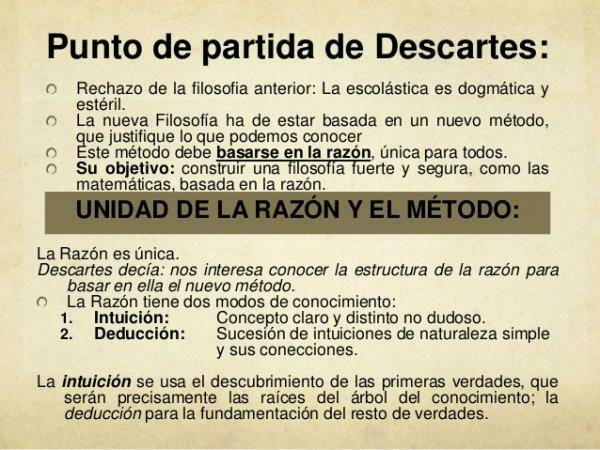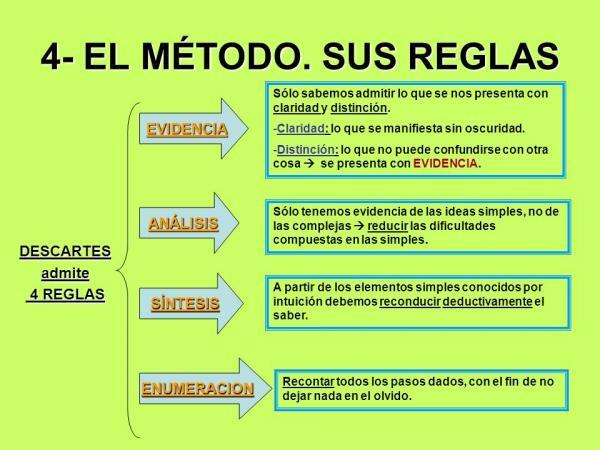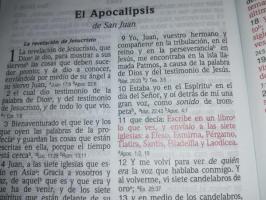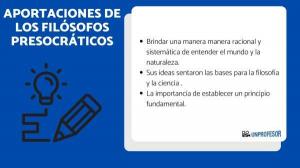Principles of the philosophy of Descartes

Image: SlidePlayer
In this lesson from a TEACHER we will talk about Discards, the father of the modern philosophy and their Principles of Philosophy. The rationalist philosopher, defends the existence of innate ideas, the autonomy of reason, which he considers endowed with natural light, and bets on the scientific method as the only way to reach the truth. Thus, Descartes, part of the doubt to get to the truth. The doubt will then be his starting point and his method. Do you want to know more about the Principles of the Philosophy of Descartes? In this lesson from a TEACHER, we tell you everything. We started!
Index
- Principles of Philosophy, by Descartes
- Doubt as a method
- Cogito ergo sum. The first obvious truth
- The 4 rules of method
Principles of Philosophy, by Descartes.
Descartes publishes his Principles of Philosophy in the year 1644, in Latin and consists of a compendium of all the scientific knowledge that existed until that moment. Four years later, the work was translated into French. This work, considered one of the greatest of all time, is divided into four parts:
- 1st part. Principles of knowledge and its limits, doubt as a method, the code and the existence of innate ideas.
- 2nd part. Principles of material things, that is, those endowed with extension, and movement as a faculty thereof.
- 3rd part. Cosmology theory based on mathematics. Like Galileo, Descartes was convinced that the universe was written in mathematical language.
- 4th part. Treaty of nature or natural sciences that covers different fields, starting from the same principles of physics. The same method, the mathematical one, for all sciences: geology, meteorology, or chemistry, among others.
This work is dedicated to Princess Elizabeth of Bohemia and although it contradicts much of Aristotelian philosophy, Descartes wanted it to be studied at universities.

Image: Comparison Chart
Doubt as a method.
Descartes part of doubt as a method to get to the truth, since this is the only way to leave behind the prejudices that accompany the human being and that make it difficult to access true knowledge. Thus, it can only be affirmed that something is true, everything that is presented to the mind as clear and different, so much so that there is no doubt about its evidence.
The doubt is universal, methodical, theoretical, hyperbolic. And so, he doubts everything there is, the existence of an external world, the senses and mathematics, reaching the conclusion that only God is free from all suspicion, eliminating the hypothesis of the evil genius and making the perfection of God the criterion of guarantee of the truth.
A perfect God could not deceive us, therefore, doubt leads to the affirmation of a reality external to the human being, of the cogito, of a thinking subject, and doubting, the same that is not able to distinguish between wakefulness and sleep, and innate ideas, such as mathematics. The problem of error, says Descartes, is not in reason, but in the lack of a method.

Image: SlidePlayer
Cogito ergo sum. The first obvious truth.
Descartes arrives, through his method, a first obvious truth. The only thing we cannot doubt is that we doubt, which shows the existence of a thinking subject, that is, of the cogito, which is summarized in the phrase cogito ergo sum. It is possible that there is no extension or a divine being in the sky, but of what there is no doubt, is that there is a substancethinking.
Descartes affirms, starting from this first certainty, the existence of two other substances, or ways of being, the body and the soul. Therefore, there are 3 substances:
- Res cogitans. The thought, the mind. The first thing that is known.
- Extensive res. The body, matter.
- Infinite res. The soul, God.
Doubt is the only method to approach the true knowledge, by allowing the human being to detach of the prejudices that he dragged, and that leads him to affirm the existence of a first undoubted truth: Cogito ergo sum, I think, therefore I exist, the first obvious truth in the entire history of philosophy. Thought, mind, is for the philosopher, natural lumens, capable of knowing with greater certainty than the senses.
The 4 rules of the method.
Then the 4 rules of the Descartes method (2nd part of the Discourse on the Method of René Descartes)*:
1ª. Evidence."Do not admit anything as true if you do not know with evidence that it is, that is, carefully avoid precipitation and prevention, and do not understand in my judgments nothing more than that which presents itself so clearly and distinctly to my mind that there should be no occasion to put it into doubt."
2ª. Analysis."Divide each of the difficulties that I will examine, into as many parts as possible and as many as your best solution requires"
3ª. Synthesis."Conduct my thoughts in an orderly fashion, starting with the simplest and easiest objects to know, to go up gradually until the knowledge of the most compound and even assuming an order between those that do not precede naturally.
4ª. Enumerations and revisions."Doing such counts of everything integral and such general revisions that I was sure not to omit anything. "
*Descartes, R. 2nd part The Discourse of the Method, (P. 82-83). Editorial Alliance, 1985.

Image: SlidePlayer
If you want to read more articles similar to Principles of Descartes' philosophy - Summary, we recommend that you enter our category of Philosophy.
Bibliography
- Descartes, R, The Principles of Philosophy, Editorial Alliance
- Descartes, R. The Discourse of the Method, 2nd part, Editorial Alliance



